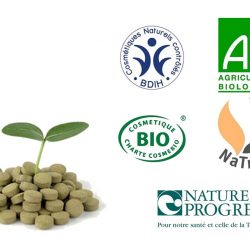Organic cosmetics have the same hygienic and beautifying function as cosmetics produced by the chemical industry. However, their manufacturing rules differ in that they use natural raw materials from organic farming and do not contain extracts of animal origin or synthetic chemicals. These environmentally-friendly products do not contain extracts of animal origin and are not tested on animals.
Cosmetic products are an integral part of our daily lives, but we are not always aware of their composition and their impact on our health and the environment. That’s why more and more consumers are turning to organic cosmetics, certified by independent bodies. In this article, we explore the importance of organic certification for quality cosmetics.
Introduction
The cosmetics industry is constantly evolving, with new products appearing on the market every year. Unfortunately, these products are not always free from chemicals that are harmful to health and the environment. That’s why more and more consumers are aware of the importance of choosing organic cosmetics certified by independent bodies and made with natural ingredients.
The benefits of organic cosmetics
Organic cosmetics are made from natural ingredients, such as essential oils, plant extracts, vegetable waxes, vegetable oils and natural butters. Unlike conventional cosmetics, organic cosmetics do not contain harmful chemicals such as parabens, phthalates, sulphates and synthetic preservatives. Organic cosmetics are also more environmentally friendly, as they use natural and renewable ingredients in their manufacture
Organic certification
Organic certification is a rigorous process whereby an independent body examines the ingredients and production methods used to manufacture an organic cosmetic product. Certified organic cosmetics must meet strict criteria in terms of ingredients, manufacturing and packaging. The best-known organic certification bodies are Ecocert, Cosmebio and Natrue.
Historical background
Evolution of organic certification
Organic certification went through several important phases before becoming a central element in the cosmetics industry. Historically, the concept of organic certification emerged in the food sector, driven by a growing desire for transparency and traceability in production processes. The 1960s and 1970s saw a growing ecological awareness and interest in healthy lifestyles, which led to the formulation of the first organic certification standards.
Initially, these standards focused on agriculture, with particular emphasis on the non-use of synthetic chemicals and the preservation of natural ecosystems. In the following years, these principles began to be extended to other areas, including cosmetics. The 1980s and 1990s marked a turning point, with the establishment of organic standards and labels specifically for cosmetic products. Organisations such as ECOCERT in France played a leading role in defining and implementing these standards.
The growth of organic certification in the cosmetics sector has been stimulated in part by increased awareness of the effects of synthetic ingredients on health and the environment. Scandals involving dangerous chemicals in conventional cosmetics have heightened public interest in safer, more environmentally-friendly alternatives.
The rise of organic cosmetics in the beauty industry
The integration of organic principles into the cosmetics industry has revolutionised the way beauty products are perceived and used. Organic cosmetics have gained in popularity not only because of their perceived safety, but also because of their effectiveness and superior quality. Consumers have become increasingly attentive to labels and certifications, looking for products that match their ethical and environmental values.
Against this backdrop, many beauty brands have started to incorporate organic ingredients into their formulas, and some have even restructured their production to obtain organic certification. This trend has also paved the way for new brands dedicated entirely to organic cosmetics, which have been able to capitalise on the growing demand for products that respect the environment and our health.
The rise of organic cosmetics has also been influenced by the development of more advanced technologies in the production and extraction of natural ingredients. This has resulted in products that are not only environmentally friendly but also highly effective, capable of competing with traditional cosmetics in terms of efficacy and texture.
The evolution of organic certification and the rise of organic cosmetics in the beauty industry reflect a paradigm shift in consumer habits and priorities. This marks an important step towards a more responsible beauty industry that is more aware of its impact on health and the environment.
Organic certification criteria
To be certified organic, a cosmetic product must meet strict criteria in terms of ingredients, manufacturing and packaging. Ingredients must be natural and organically produced. Synthetic chemicals are banned or strictly regulated. Production methods must respect the environment, ethics and workers’ rights. Packaging must be environmentally friendly and recyclable.
Organic labels
Certified organic cosmetics are labelled with labels that guarantee their certification. These labels are affixed to the packaging and let consumers know that they are buying a certified organic cosmetic product. The most common labels are Ecocert, Cosmebio and Natrue.
Health benefits
Organic cosmetics are not only environmentally friendly, they are also good for your health.
There are no chemical active ingredients here, just natural ones:
- vegetable oils
- plant extracts
- essential oils
- plant waxes
The importance of the organic label
For a cosmetic product to be recognised as “organic”, manufacturers must comply with the manufacturing, composition and testing rules set out in the charters and labels currently on the market. These labels have been set up by groups and associations concerned with consumer health.
What’s more, if you want to be sure of the product you’re buying, it’s best to opt for a product with a label. This means that it has undergone a reliable certification process, carried out by independent certification bodies.
All natural cosmetics from the Weleda brand, for example, must carry the NATURE label. Since its creation in 1921, Weleda has used only 100% natural ingredients in the manufacture of its products. This guarantee, certified by the NATURE label, the strictest international quality label, applies to natural cosmetics. Today, a weleda product contains only natural ingredients and is completely free from synthetic fragrances and colourings, preservatives, silicones, ingredients of mineral origin or genetically manipulated ingredients. Weleda selects its ingredients with particular care, according to their specific action and their benefits for the skin: mainly pure plant oils and plant extracts, mostly organic, and natural essential oils. Weleda tests each product dermatologically to assess its tolerance and effectiveness.
Environmental impact
Sustainable sourcing and production
Sustainable sourcing and production are at the heart of the positive environmental impact of organic cosmetics. This approach focuses on using renewable resources and minimising ecological impact at every stage of the production process. As part of organic certification, ingredients must be grown without pesticides or chemical fertilisers, which preserves the quality of soil and groundwater. In addition, sustainable sourcing often involves adopting organic farming practices that promote biodiversity and keep ecosystems healthy.
Sustainable production in the organic cosmetics industry also includes the use of renewable energy and the reduction of waste. For example, the use of solar or wind power in production plants helps to reduce greenhouse gas emissions. Similarly, organic production practices seek to minimise waste production and promote the recycling and reuse of materials. Organic cosmetics packaging is often designed to be environmentally friendly, using recycled or biodegradable materials.
Reducing the ecological footprint
Adopting organic cosmetics has a direct impact on reducing the ecological footprint. By choosing products derived from environmentally-friendly farming and production practices, consumers are helping to reduce pollution and the degradation of ecosystems. This reduction in the ecological footprint is all the more significant given that the cosmetics industry has traditionally been a significant source of environmental pollution, particularly through the use of plastics and harmful chemicals.
Organic cosmetics avoid the use of petroleum-derived ingredients and synthetic chemical compounds, reducing dependence on fossil fuels and their environmental impact. Furthermore, by encouraging cultivation methods that improve soil fertility and reduce erosion, organic cosmetics play a role in combating climate change. Organic farming practices also help to store more carbon in the soil, which helps to offset greenhouse gas emissions.
In short, the environmental impact of organic cosmetics is deeply linked to their sustainable sourcing and production, as well as their ability to reduce the overall ecological footprint. This holistic approach to beauty is part of a wider movement towards responsible, environmentally-friendly consumption, reflecting the values of a society that is increasingly aware of the ecological emergency.
Organic certification for quality cosmetics
For example, weleda organic cosmetics do not contain the following substances:
Parabens, sodium laureth sulphate, synthetic colourings and fragrances, silicones, “PEG”, phthalates, paraffin… and other unnatural substances formally banned from all Weleda skincare products.
- 100% natural cosmetics
- Rich in vegetable oils, vegetable waxes and plant extracts
- Natural formulas without mineral oil, silicone, preservatives, colouring agents or synthetic fragrances
- Raw materials mainly from biodynamic or organic farming, or certified harvesting.
- More than 350 species of wild medicinal plants from biodynamic or organic farming
- Processing methods based on the pharmaceutical tradition and non-denaturing production processes subject to rigorous laboratory quality control
- Total transparency towards the consumer, with a detailed composition in French for all our cosmetic products
- Ecological waste management and recyclable packaging
The Weleda brand quality approach
On 22 February, UFC Que Choisir published an investigation into undesirable ingredients in cosmetics. Weleda natural and organic cosmetics are not among the products and brands incriminated in this study. This once again demonstrates the integrity of Weleda’s quality approach, which refuses to use any synthetic or mineral substances in its formulas, as well as any denaturing transformation process.
This survey also highlights the difficulty for consumers to find their way around INCI compositions and how to decipher them. Weleda, for example, has been translating the vast majority of INCI compositions into French on its cosmetics packaging for decades, to provide greater transparency for consumers.
It’s also worth noting that the tinted glass bottles emblematic of Weleda organic cosmetics help to preserve the natural formulas (find out more about packaging management at Weleda).
That’s why choosing an organic cosmetic means not only respecting the environment, but above all ensuring the use of a quality product certified by an approved body confirming that the product is non-toxic to your health. Don’t hesitate to ask your pharmacist for advice on the appropriate use of organic skincare products for your baby..





